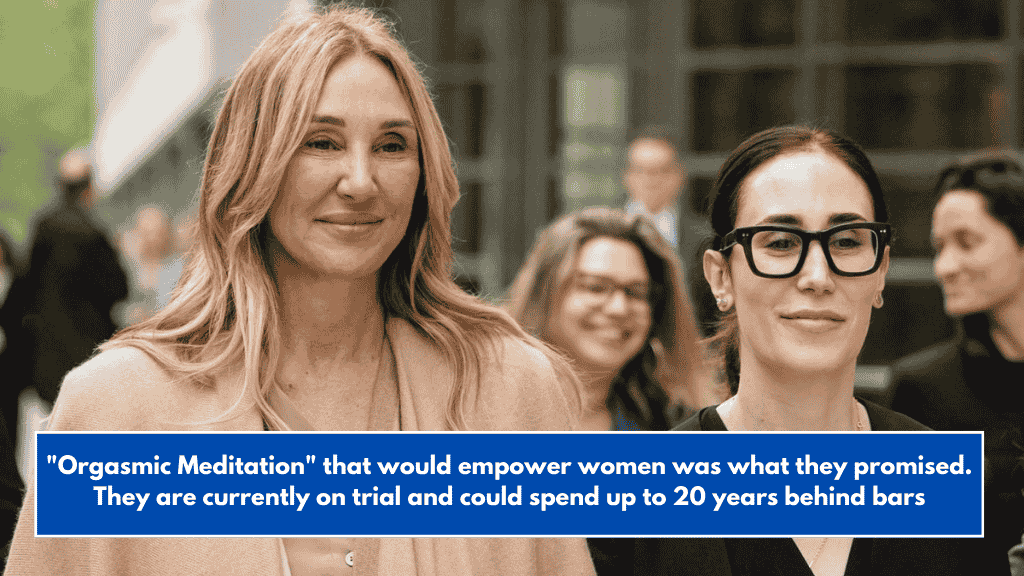Nicole Daedone and Rachel Cherwitz, the co-founders of the controversial sexual wellness company OneTaste, are facing serious charges in federal court after being accused of manipulating vulnerable women into working for minimal pay and engaging in sexual acts with investors. The trial, which began on May 6, 2025, in Brooklyn, New York, has drawn attention due to the company’s controversial practices and the serious nature of the allegations.
Allegations of Forced Labor and Abuse
In June 2023, Daedone, 57, and Cherwitz, 44, were charged with one count of forced labor conspiracy. According to federal prosecutors, employees and others involved with OneTaste accused the women of subjecting them to physical, emotional, sexual, and psychological abuse under the guise of empowerment and wellness. The indictment claims that the women were coerced into performing sex acts for investors and clients while being manipulated into debt, all while receiving very little pay or none at all. The women were allegedly surveilled and subjected to intimidation tactics, making them feel trapped and controlled in their circumstances.
Former U.S. Attorney Breon Peace emphasized the abuse, stating that the defendants “sought complete control over their employees’ lives” and exploited them under false pretenses of personal growth and empowerment.
OneTaste’s Founding and Practices
OneTaste was founded in 2004 by Daedone in San Francisco with the goal of empowering women through sexual wellness, particularly by promoting the practice of “orgasmic meditation.” The company introduced a method where a woman is sexually stimulated for 15 minutes as a form of self-empowerment. Daedone, a longtime practitioner of Buddhism, described the practice as a “scientific-based” approach to improving well-being, similar to yoga but with a focus on sexual pleasure.
From 2004 to 2018, OneTaste offered courses, coaching, and events that generated significant revenue. The company expanded to several major cities, including New York, Los Angeles, Las Vegas, and London, and even gained a celebrity following with public figures such as Gwyneth Paltrow and Khloe Kardashian endorsing its practices.
Despite its apparent success, prosecutors allege that OneTaste’s operations were less about empowerment and more about exploitation, with women who were victims of sexual trauma being lured into the company’s practices.
Defense Arguments and Denial of Allegations
In response to the charges, Daedone and Cherwitz have pleaded not guilty and maintain their innocence. Daedone’s attorney, Jennifer Bonjean, strongly denied the accusations, arguing that no one was forced to engage in any activities at OneTaste. According to Bonjean, the women involved were consenting adults who later regretted their actions and falsely claimed to have been coerced. She referred to the interactions as “growth,” stating that they were not the result of force or manipulation.
Daedone herself previously dismissed the charges as a “narrative shaped by the media and adopted by the government,” describing OneTaste as a company focused on empowerment and healing. A spokesperson for the defense also criticized the trial, calling it a case built on “sensationalism and retroactive reinterpretation of adult choices.” The defense team has expressed confidence that the facts will clear their clients in court.
The Consequences of Conviction
If convicted, Daedone and Cherwitz face up to 20 years in prison for their alleged involvement in forced labor conspiracy and abuse. The case has brought attention to the intersection of wellness practices, consent, and exploitation, raising questions about the boundaries of personal choice and control in such environments.
The trial of Nicole Daedone and Rachel Cherwitz is set to unfold over the coming weeks, with both sides presenting starkly contrasting views of OneTaste’s operations. As the case progresses, the legal system will decide whether the company’s practices were truly about empowerment or if they were a front for manipulation and abuse. The outcome will have significant implications for how wellness and empowerment-based businesses are regulated and held accountable in the future.














